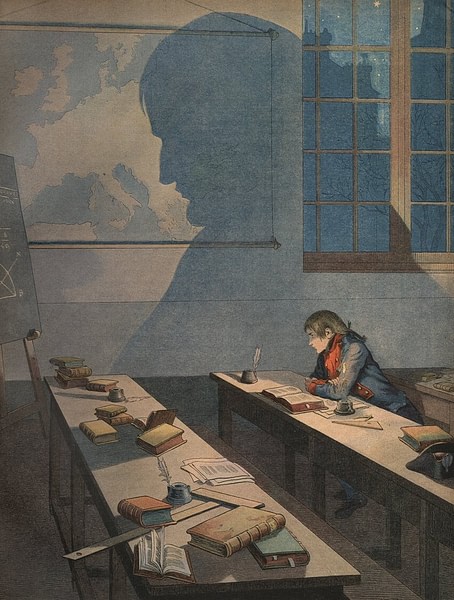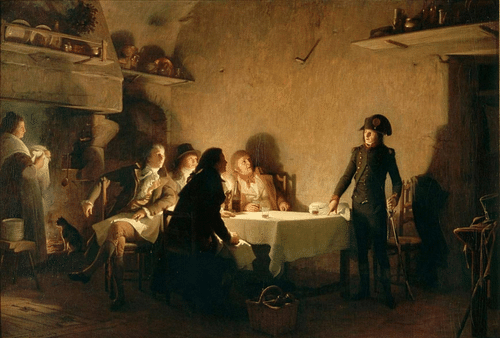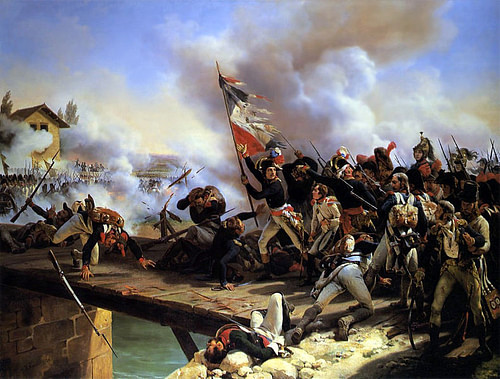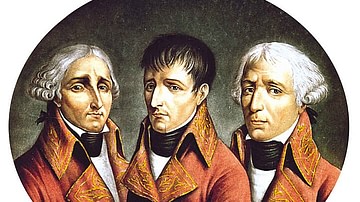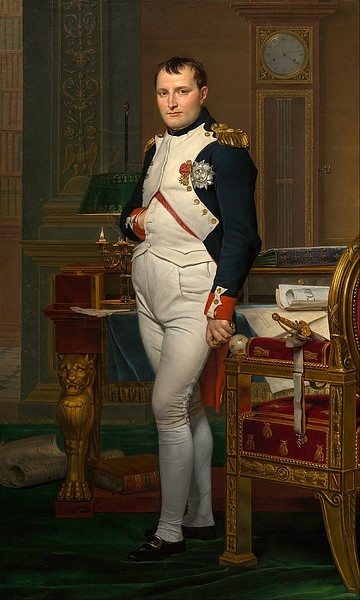
Napoleon Bonaparte (1769-1821) was a Corsican-born French general and politician who reigned as Emperor of the French with the regnal name Napoleon I from 1804 to 1814 and then again briefly in 1815. He established the largest continental European empire since Charlemagne and brought liberal reforms to the lands he conquered at the cost of the destructive Napoleonic Wars (1803-1815).
Born to a family of minor Corsican nobility, Napoleon rose to prominence in the French army during the French Revolutionary Wars (1792-1802), leading military campaigns in Italy and Egypt. He seized control of the French Republic in the Coup of 18 Brumaire of 1799 and crowned himself Emperor of the French in 1804. Napoleon and his famed Grande Armée fought against several coalitions of European powers; by the time of the Treaties of Tilsit of July 1807, his authority covered most of Western and Central Europe.
However, after the disastrous failure of Napoleon's invasion of Russia in 1812, most of Europe turned against him. He was defeated and exiled to the Mediterranean island of Elba in April 1814, only to make a triumphant return to France the following year, beginning the period of his second reign known as the Hundred Days. He was soon defeated once again at the Battle of Waterloo (18 June 1815), after which he was exiled for a final time to the island of St. Helena in the South Atlantic, where he died on 5 May 1821.
Napoleon is best remembered for his military career, over the course of which he fought 60 battles and lost only seven. His military innovations changed European warfare; he utilized conscription, popularized the implementation of corps as an army's largest unit, and pioneered certain military tactics that have been studied ever since. He is often ranked alongside Alexander the Great and Julius Caesar as one of history's most brilliant generals. He also implemented a set of civil laws, best known as the Napoleonic Code, that was adopted throughout much of continental Europe and influenced the judicial systems of many modern nations. Alternatively viewed as a reformer and an autocrat, a warmonger and a defender of liberties, Napoleon enjoys a controversial reputation but remains one of Western history's best-known figures.
Early Life
The future French emperor was born Napoleone di Buonaparte in Ajaccio, Corsica, on 15 August 1769. The Buonaparte family had originated in Italy before emigrating to Corsica in 1529, where they established themselves amongst the minor nobility; Napoleon's father, Carlo Buonaparte, was a lawyer, prosperous enough to own the three-story Casa Bonaparte in Ajaccio as well as a countryside house, a vineyard, and a flock of sheep. Napoleon was the second surviving child of Carlo and Maria-Letizia Bonaparte; he had an older brother, Joseph, and younger siblings Lucien, Elisa, Louis, Pauline, Caroline, and Jerôme.
For centuries, Corsica had been controlled by the Republic of Genoa but allowed to effectively govern itself. However, in 1768, Genoa sold Corsica to the Kingdom of France, which was interested in a more direct administration style. This was met with resistance, and an initial French expeditionary force was checked by a group of Corsican freedom fighters led by the charismatic Pasquale Paoli. At the decisive Battle of Ponte Novu in May 1769, the French defeated Paoli's Corsicans, who were forced into hiding. Carlo Buonaparte had initially supported Corsican independence, but after the Corsican defeat, Carlo swore allegiance to his new French overlords. In return, the new French administration awarded the Buonaparte family with new titles and honors.
In April 1779, Carlo used his new French connections to send his two eldest sons to school in France. Nine-year-old Napoleon was enrolled in the Royal Military School of Brienne-le-Château near Troyes to begin studying for a military career. Napoleon spent the next five years at this boarding school, where his strong Corsican accent, strange-sounding name, and fierce Corsican patriotism set him apart from the other students; lacking friends, Napoleon turned to the company of books. For a time, he considered embarking on a writing career and penned no fewer than 60 essays, novellas, and pamphlets, including a history of Corsica. In the classroom, Napoleon was intellectually gifted, particularly in the field of mathematics. Despite being educated by monks, he was skeptical of the divinity of Jesus Christ; this skepticism led him to view religion as a political tool, which he would wield effectively during his career.
In February 1784, Carlo Buonaparte died. Two years later, Napoleon graduated from the prestigious École Militaire as an artillery lieutenant but spent most of the subsequent months on leave in Corsica. Napoleon and his siblings enthusiastically supported the French Revolution when it began in 1789, with Napoleon winning election as a lieutenant colonel in the revolutionary National Guard in April 1792. Their support of the new French government put the Bonaparte siblings at odds with Paoli, who still championed Corsican independence. Rising tensions between the Bonapartes and Paoli's supporters soon forced Napoleon's family to flee to mainland France in 1793. Exiled from his homeland, Napoleon was no longer a Corsican nationalist but was now committed to the French cause.
The Revolution
In the spring of 1792, Revolutionary France went to war with Austria and Prussia, kicking off the Revolutionary Wars. After the stunning French victory at the Battle of Valmy (20 September 1792), the First French Republic was proclaimed, and King Louis XVI of France was guillotined on 21 January 1793. As the French Republic became more radical and belligerent, additional nations joined the war against it, including Great Britain, Spain, and the Dutch Republic. On 28 August 1793, a fleet of British and Spanish ships occupied the harbor of Toulon; since Toulon housed the entire French Mediterranean Fleet, it was vital for the Republic.
Meanwhile, Napoleon published a pro-Jacobin pamphlet entitled Le Souper de Beaucaire, where he argued for the necessity of the extreme measures pursued by the revolutionary government. This pamphlet impressed several powerful Jacobin leaders, which led to Napoleon's appointment as commander of the French artillery at the Siege of Toulon. Napoleon displayed valuable leadership abilities during the siege, and his cannons were crucial to the French victory on 19 December 1793; though he was wounded during the final assault, Napoleon was promoted to brigadier general after the battle, aged only 24.
In July 1794, the Reign of Terror ended, and the Jacobins fell from power; Napoleon was briefly arrested but was ultimately released. With the downfall of his benefactors, it appeared that Napoleon's brief career may already be over. This changed on 4 October 1795, when the Republic's government was scrambling to defend Paris from an impending royalist insurrection. Since Napoleon was one of the few qualified officers in the capital, he was put in charge of the defense, a task he carried out with ruthless efficiency; after requisitioning some cannons, Napoleon's troops fired grapeshot into the crowd.
By suppressing the Revolt of 13 Vendémiaire, Napoleon won the attention of Paul Barras, one of the leaders of the new government called the French Directory. In 1795, Barras introduced the young general to Joséphine de Beauharnais, a 32-year-old widow with whom Napoleon quickly fell in love. Additionally, Barras secured Napoleon's appointment to the command of the French Army of Italy. On 9 March 1796, Napoleon married Joséphine in a civil ceremony before leaving for Italy two days later; it was at this point that he began spelling his name in a Frenchified way, as "Napoleon Bonaparte".
Italy, Egypt, & Brumaire
When Napoleon first arrived in Italy, his officers did not think much of him. He was a small, thin man, only 26 years old with no experience leading an army. But this opinion quickly changed; after whipping the undisciplined Army of Italy into shape and procuring much-needed supplies, Napoleon embarked on a lightning campaign against the Kingdom of Piedmont-Sardinia, knocking it out of the war within a month. He then campaigned against the Austrians, capturing Milan, and setting up several French client states in northern Italy. He went on to besiege the Austrian stronghold of Mantua, defeating Austrian armies at the Battle of Castiglione (5 August 1796), the Battle of Arcole (15-17 November), and the Battle of Rivoli (14-15 January 1797). When Mantua finally fell in February 1797, Napoleon's army was poised to threaten Vienna; the Austrians asked for an armistice and signed the Treaty of Campo Formio in October, ending the War of the First Coalition.
The brilliant success of Napoleon's Italian Campaign won him the love of his troops, who referred to him affectionately as 'the Little Corporal'. It also launched him to political superstardom in France; tales such as his heroic charge across the Arcole bridge became well-known and formed the basis for the Napoleonic legend. In 1798, Napoleon secured permission to lead an army to Egypt to threaten British dominance in the region. After beating the Mamluks at the Battle of the Pyramids (21 July) and capturing Cairo, Napoleon advanced into Syria where he was halted by an Anglo-Ottoman force at the Siege of Acre (20 March-21 May 1799). He was forced to withdraw to Alexandria and slipped out of Egypt in August 1799. Although Napoleon's campaign in Egypt and Syria was a military failure, it greatly advanced the field of Egyptology with the discovery of the Rosetta Stone.
In October 1799, Napoleon landed in France and was approached by several disgruntled French officials such as Emmanuel-Joseph Sieyès who wanted to use him as the 'sword' of a coup. Napoleon accepted and, on 9-10 November 1799, overthrew the government in the bloodless Coup of 18 Brumaire. Napoleon then outmaneuvered Sieyès to become the leading figure of the new government, called the French Consulate. His rise to power marked the end of the French Revolution and ushered in the Napoleonic era.
First Consul & Emperor
The Consulate lasted for four years, during which time Napoleon accomplished some of his longest-lasting political achievements. He negotiated the Concordat of 1801, which reconciled France with the Catholic Church, and established the Napoleonic Code, which echoed some of the liberal reforms of the Revolution. He sent an invasion force to reclaim Haiti and reestablish slavery there; this invasion force failed, and Haiti gained its independence in 1804. Additionally, as First Consul, Napoleon made the Louisiana Purchase, which doubled the size of the United States. Militarily, he crossed the Alps and defeated the Austrians at the Battle of Marengo (14 June 1800) and secured an end to the Revolutionary Wars two years later with the Treaty of Amiens. Around this time, he was confirmed First Consul for life by a plebiscite.

Napoleon knew his budding regime would not be secure unless he could establish a hereditary empire. So, on 18 May 1804, Napoleon proclaimed the French Empire with himself as Emperor of the French. The Coronation of Napoleon I was held at the Notre-Dame de Paris Cathedral on 2 December, where Napoleon took the crown and placed it on his own head. By this point, the Napoleonic Wars had already begun, as Britain had declared war on France in May 1803. However, after Napoleon's coronation first as Emperor of the French, then as King of Italy in March 1805, Britain was joined by Austria, Russia, and Naples in the War of the Third Coalition (1805-1806) against France. Napoleon wasted no time marching into Germany at the head of his new Grande Armée, which was subdivided into eight semi-autonomous corps to allow for more speed and flexibility.
This corps system proved greatly effective and allowed Napoleon to force the capitulation of an Austrian army at the end of the Ulm Campaign. He then captured Vienna on 13 November and decisively defeated an Austro-Russian army at the Battle of Austerlitz (2 December 1805), largely regarded as one of his greatest victories. After Austria's surrender, Napoleon reorganized several German states into the Confederation of the Rhine under his own protection; this directly led to the dissolution of the Holy Roman Empire in July 1806. Napoleon also deposed the Bourbon king of Naples and installed his brother Joseph on its throne; Louis Bonaparte would be made King of Holland in 1806, while Jerôme got the Kingdom of Westphalia in 1807. An attempt to establish a dynasty, Napoleon has often been criticized for giving too much power to his less competent brothers.
In October 1806, Prussia joined with Russia and Britain in the War of the Fourth Coalition (1806-1807). Napoleon smashed the Prussian army at the Battle of Jena-Auerstedt (14 October) and entered Berlin only days later. Pushing on into Prussian-occupied Poland, he created a new client state, the Grand Duchy of Warsaw, before fighting the Russians to a standstill at the bloody Battle of Eylau (7-8 February 1807). On 14 June, Napoleon beat the Russians at the Battle of Friedland, after which he met with Tsar Alexander I of Russia (r. 1801-1825) on a raft in the middle of the Niemen River to negotiate peace. In the ensuing Treaties of Tilsit, a Franco-Russian alliance was established, and Alexander agreed to join Napoleon's large-scale embargo against Britain, known as the Continental System. The treaties also saw Prussia lose half its territory. This was arguably the peak of Napoleon's power, his influence stretching across Western and Central Europe.
Spain & Russia
In 1807, Napoleon ordered an invasion of Portugal to punish it for not complying with the Continental System. Lisbon fell quickly, but Napoleon was unsatisfied; ever the opportunist, he took advantage of a quarrel within Spain's royal family to invade Spain and install his brother Joseph on the Spanish throne in 1808. The Portuguese and Spanish were quick to resist French occupation and launched the Peninsular War (1807-1814). Aided by British soldiers, the Portuguese and Spanish put up stubborn resistance that included brutal guerrilla warfare; before long, 200,000 French soldiers were tied down in the region, putting a strain on French military resources.
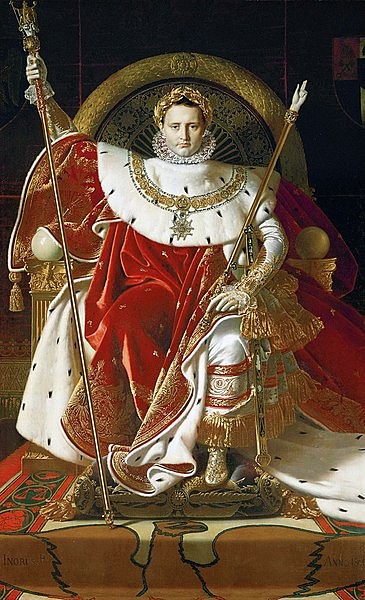
Meanwhile, the initial successes of the Iberian rebels emboldened the Austrian Empire to launch the War of the Fifth Coalition in April 1809. It was during this war, on the banks of the Danube, that Napoleon suffered his first defeat as emperor at the Battle of Aspern-Essling (21-22 May). Though he eventually regrouped and defeated the Austrians at the Battle of Wagram (5-6 July), Aspern-Essling proved to Europe that Napoleon could be defeated. In the aftermath of the war with Austria, Napoleon married the Austrian Archduchess Marie Louise, daughter of the Habsburg emperor, in April 1810; he had divorced Joséphine the previous January because she failed to produce an heir. On 20 March 1811, Marie Louise gave birth to a boy, Napoleon II, who was styled as the King of Rome.
By 1811, the French and Russian empires were on a collision course; Russia viewed the existence of the French-controlled Duchy of Warsaw as a threat while Napoleon felt betrayed when Tsar Alexander exited the Continental System. On 24 June 1812, Napoleon's invasion of Russia began, as over 615,000 French and allied troops crossed the Niemen River, the largest invasion force Europe had yet seen. The Russians, however, refused to give battle, luring the French deeper into their territory and engaging in scorched-earth tactics along the way. This was greatly effective, as the French lost over 100,000 men to attrition before the first major battle was even fought. On 7 September, the French and Russians fought the bloody Battle of Borodino, and Napoleon entered Moscow a week later. However, the city was deserted and was soon engulfed in flames, rendering it useless to the occupying army.
Downfall
After realizing the Russians were not about to make peace, Napoleon ordered a retreat in October. However, the onset of a brutal winter and the pursuing Russian armies decimated Napoleon's Grande Armée; by the time the French crossed back over the Niemen River in December 1812, they had lost half a million men. The great powers of Europe leaped at the chance to finally defeat Napoleon. In the subsequent War of the Sixth Coalition (1813-1814), Russia was joined by Britain, Prussia, Austria, and Sweden. After Napoleon suffered another crushing defeat at the Battle of Leipzig (16-19 October 1813), many of his German allies defected, and the Confederation of the Rhine was dissolved. The Coalition then invaded France, leaving Napoleon with no choice but to abdicate on 11 April 1814. He was exiled to the Mediterranean island of Elba, and King Louis XVIII of France ascended the throne.
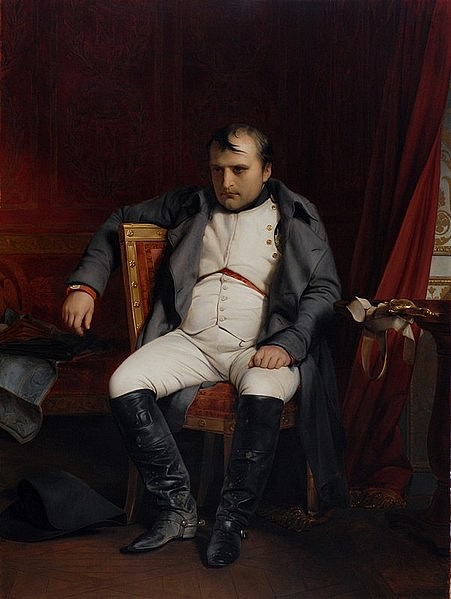
On 1 March 1815, Napoleon took advantage of the political unrest caused by the Bourbon Restoration and landed on the coast of southern France with 1,000 soldiers. On 20 March, he entered Paris in triumph, beginning the period of his second reign known as the Hundred Days. His enemies wasted no time branding him an outlaw and raising new armies. By late May, the Seventh Coalition had sent two armies to Belgium to threaten northeastern France including an Anglo-Dutch-German army led by Arthur Wellesley, Duke of Wellington, and a Prussian army led by Gebhard Leberecht von Blücher. On 15 June 1815, Napoleon marched into Belgium to meet this new threat but was decisively defeated at the Battle of Waterloo (18 June 1815). He abdicated again four days later and was exiled to the lonely island of St. Helena in the South Atlantic. Here, he was kept under close guard by his British captors. His health steadily deteriorated until he died on 5 May 1821, at the age of 51.

